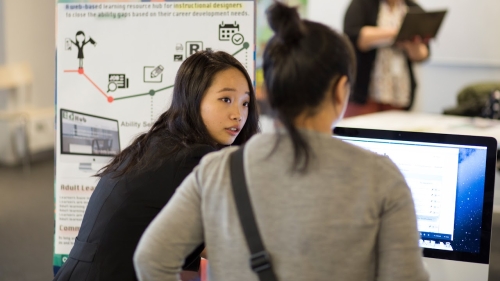

Jan L. Plass
Professor and Paulette Goddard Chair in Digital Media and Learning Sciences
Administration, Leadership, and Technology
The Consortium for Research and Evaluation of Advanced Technologies in Education (CREATE)
Dr. Jan L. Plass, Paulette Goddard Chair in Digital Media and Learning Sciences and Professor at New York University, is the founding director of the CREATE Consortium for Research and Evaluation of Advanced Technology in Education and co-director of the Games for Learning Institute. Dr. Plass draws from a broad range of fields, including cognitive science, learning sciences, computer science, and design, to conceptualize, implement, and study new and more effective ways of learning with digital technologies, especially for underserved communities. His research group is investigating cognitive, social, and emotional design patterns for the design of effective simulations, games, augmented reality, virtual reality, and mixed reality tools for learning a wide range of topics for learners of all ages. This work has been funded by over 30 research and development grants from national and international federal agencies and private foundations. For one of his projects, Project Hope, he led a team to design, implement, and evaluate a digital curriculum for Syrian refugee children in Turkey and in Jordan. He is the author of over 120 journal articles, chapters, and conference proceedings, has given more than 200 presentations, and is the lead editor of Cognitive Load Theory (Cambridge University Press, 2011) and of the Handbook of Game-based Learning (MIT Press, 2020). Dr. Plass is a frequent national and international keynote speaker and advisor, helping companies enhance the impact of their products by applying cognitive science and learning sciences principles. Dr. Plass received his MA in Mathematics and Physics Education and his Ph.D. in Educational Technologies from Erfurt University (PH Erfurt, Germany).
NYU Institute for Games for Learning
Dr. Plass is Co-Director of the Games for Learning Institute (G4LI), a multi-university collaboration established in 2008 with support from Microsoft Research and the Motorola Foundation. G4LI is dedicated to advancing the design, use, and evaluation of digital games in formal and informal educational settings. The Institute works to provide fundamental scientific evidence of "what works" in games for learning - what makes certain games compelling and playable, and what design elements make games effective for learning. The results provide critically important information to researchers, game developers, and educators, and point the way to a new era of playful learning.
Center for Research and Evaluation of Advanced Technologies in Education
Dr. Plass is the founding director of CREATE, the Center for Research and Evaluation of Advanced Technologies in Education, which is engaged in research on the design and evaluation of advanced media for learning. CREATE's mission is to advance the cognitive science and learning sciences foundations of the use of digital media for learning, develop methods and approaches for the design of digital materials based on principles derived from sound theoretical foundations, implement models, frameworks, and examples of learning applications based on these methods and principles, and develop and apply methods and criteria for the evaluation of such environments.
Selected Publications
Blume, F., Pawar*, S., Ninaus, M., & Plass, J. L. (2024). Individualisation in cognitive skills training: essential or superfluous? Examining the effectiveness of an adaptive game for training executive functions in young adults. Learning and Individual Differences, 114, 102517.
Spangenberger, P., Mathes, N., Kapp, F., Kruse, L., & Plass, J.L. (in press). Orchestrating iVR technology in an authentic classroom setting and its effects on factual knowledge, comprehension and transfer. Educational Technology Research and Development.
Albers, F., Trypke, M., Stebner, F., Wirth, J., & Plass, J. L. (2023). Different types of redundancy and their effect on learning and cognitive load. British Journal of Educational Psychology, 00, 1– 14.
McAlpin*, E., Levine, M., & Plass, J.L. (2023). Comparing Two Whole Task Patient Simulations for Two Different Dental Education. Learning and Instruction, 83, 101690.
Brodsky, J.E., Bergson, Z., Chen, M., Hayward, E.O., Plass, J.L., & Homer, B.D. (2023). Language, Ambiguity, and Executive Functions in Adolescents’ Theory of Mind. Child Development, 94, 202–218.
Wall S.P., Castillo, P., Shuchat-Shaw, F., Norman, E., Brown, D., Martinez-López, N., López-Ríos, M., Seixas, A.A., Plass, J.L., Ravenell, J. (2021). Targeting Versus Tailoring Educational Videos for Encouraging Deceased Organ Donor Registration in Black-Owned Barbershops. J Health Communication, 27(1), 37-48.
Wall, S.P., Castillo, P., Shaw, F.S., Norman, E., Martinez-Lopez, N., Homer, B.D., & Plass, J.L. (2021). Including Medical Footage and Emotional Content in Organ Donation Educational Videos for Latinx Viewers. Health Education & Behavior, 1–13.
Wells, A., Mayer, R.E., Homer, B.D., & Plass, J.L. (2021). Playing a Video Game and Learning to Think: What's the Connection? Journal of Cognitive Enhancement, 1–9.
Ober, T.*, Brenner, C.*, Olsen, A.*, Homer, B.D., & Plass, J.L. (2021). Detecting Patterns of Engagement in a Digital Cognitive Skills Training Game. Computers & Education, Available online 28 January 2021, 104144.
Plass, J.L., Homer, B.D., MacNamara, A.*, Ober, T., Rose, M.C., Hovey, C.M.*, Pawar, S.*, & Olsen, A.* (2020). Emotional Design for Digital Games for Learning: The Affective Quality of Expression, Color, Shape, and Dimensionality of Game Characters. Learning and Instruction, 7, 101194. Doi: 10.1016/j.learninstruc.2019.01.005
Plass, J.L. & Pawar, S.* (2020). Toward a Taxonomy of Adaptivity for Learning. Journal of Research on Technology in Education, 52(3), 275-300.
Ober, T., Brooks, P.J., Plass, J.L., & Homer, B.D. (in press). Distinguishing Direct and Indirect Effects of Executive Functions on Reading Comprehension in Adolescents. Reading Psychology.
Plass, J.L., & Kalyuga, S. (2019). Four Ways of Considering Emotion in Cognitive Load Theory. Educational Psychology Review, 31, 339–359.
Plass, J.L., Homer, B.D., MacNamara, A.*, Ober, T., Rose, M.C., Hovey, C.M.*, Pawar, S.*, & Olsen, A.* (2019). Emotional Design for Digital Games for Learning: The Affective Quality of Expression, Color, Shape, and Dimensionality of Game Characters. Learning and Instruction.
Homer, B.D., Ober, T., Rose, M., MacNamara, A.*, Mayer, R., & Plass, J.L. (2019). Speed Versus Accuracy: Implications of Adolescents' Neurocognitive Developments in a Digital Game to Train Executive Functions. Mind, Brain, and Education, 13(1), 41–52.
Plass, J.L., Homer, B.D., Pawar, S.*, Brenner, C.*, & MacNamara, A.P.* (2019). The Effect of Adaptive Difficulty Adjustment on the Effectiveness of a Game to Develop Executive Function Skills for Learners of Different Ages. Cognitive Development, 49, 56–67.
Homer, B.D., Plass, J.L., Rose, M.C., MacNamara, A.*, Pawar, S.*, & Ober, T.M. (2019). Activating Adolescents’ “Hot” Executive Functions in a Digital Game to Train Cognitive Skills: The Effects of Age and Prior Abilities. Cognitive Development, 49, 20-32.
Biles, M.*, Plass, J.L., & Homer, B.D. (2018). Designing Digital Badges for Educational Games: The Impact of Badge Type on Student Motivation and Learning. International Journal of Gaming and Computer-Mediated Simulations, 10(4), 1–19.
Sirin, S., Plass, J.L., Homer, B.D., Vatanartiran, S., & Tsai, T. (2018). Project Hope: Digital Game-based Education for Syrian Refugee Children. Vulnerable Children & Youth Studies, 13, 7–18.
Homer, B.D., Plass, J.L., Raffaele, C., Ober, T. M., & Ali, A. (2018). Improving High School Students' Executive Functions Through Digital Game Play. Computers and Education, 117, 50-58.
Parong, J., Mayer, R.E., Fiorella, L., MacNamara, A.*, Homer, B.D., & Plass, J.L. (2017). Learning Executive Function Skills by Playing Focused Video Games. Contemporary Educational Psychology, 51, 141–151.
Lang, C., Ribeiro, P.C., Biles, M*., Silva, C., & Plass, J.L. (2017). Visualizing Log File Data from a Learning Game Using Timed Word Trees. Information Visualization, 1–17.
Song, H.; Kalet, A., & Plass, J. (2016). Interplay of prior knowledge, self-regulation and motivation in complex multimedia learning environments. Journal of Computer Assisted Learning, 32(1), 31–50.
Plass, J.L., Homer, B.D., & Kinzer, C. (2015). Foundations of Game-based Learning. Special Issue on Game-based Learning, Educational Psychologist, 50(4), 258–283.
Park, B., Knörzer, L., Plass, J. L., & Brünken, R. (2015). Emotional design and positive emotions in multimedia learning: An eyetracking study on the use of anthropomorphisms. Computers & Education, 86, 30–42.
Kwah, H., Milne, C., Tsai, T., Milne, C., Goldman, R. & Plass, J. (2014). Emotional engagement, social interactions, and the development of an afterschool game design curriculum. Cultural Studies of Science Education, 19, 1–28.
Homer, B.D., & Plass, J.L. (2014). Level of Interactivity and Executive Functions as Predictors of Learning in Computer-based Chemistry Simulations. Computers in Human Behavior, 36, 365–375.
*Co-authors who are mentored students
**Co-authors who are mentored post doctoral scholars
